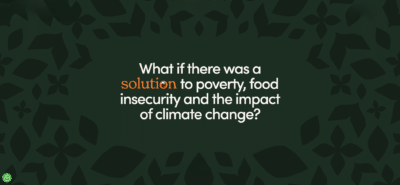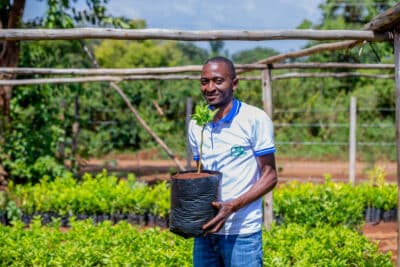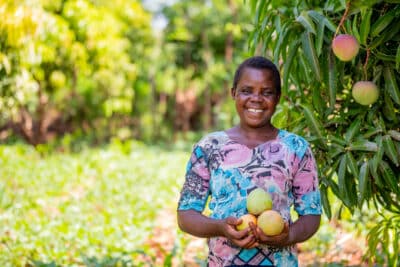News
15 October 2011
Farm Africa launches emergency project in response to drought in northern Kenya
Context
Since 2003 Farm Africa has run several different development projects in the Moyale district of northern Kenya. The project was established to reduce poverty among pastoralist communities and to promote pastoralism as a viable way of life.
Due to an increasing lack of rainfall in the region, Farm Africa set up an additional project in 2010, the Moyale Drought Mitigation Project, which formed part of its broader work in the area. The project’s aim was to mitigate the effects of drought in the area and to provide much-needed livelihood security to pastoralist communities.
Drought in Moyale
But since 2010, the situation in Moyale has significantly deteriorated: the rain seasons of November-December 2010 and April-May 2011 both failed. According to the Moyale Meterological Department, 0mm of rainfall was recorded in March and only 11.5 mm in April, against an expected 48.6mm and 89.7mm respectively. This has resulted in the suspension of the project and the setting up of the Moyale Drought Response Project. The project was started in September 2010 and will run for three months.
Drought has exerted a severe strain on Moyale’s environment, the pastoralist communities that live there and their livestock:
Impact of drought
• Scarcity of water
Lack of water in the wet-season grazing areas has forced pastoralists to remain in the dry-season grazing areas where boreholes and shallow wells are the only source of water.
This in turn is putting a significant strain on the boreholes and wells.
As drought both leads to the deterioration of livestock condition and increases the possibility of death, livestock populations are putting water points under huge pressure.
Bore holes are currently operating at 18 hours a day (as opposed to a seasonal norm of 6-7 hours). Average waiting time at the water sources now varies between 3-6 hours.
Unsurprisingly pumps at the water sources are breaking down due to over-use and Water User Committees have identified a critical need for spare parts and servicing to maintain the boreholes.
Failure of any of these water-sources will result in a life-threatening crisis.
• Increased livestock mortality
Livestock are the main assets of pastoralists. To maintain the optimum value of these assets, regular feed is essential. But the failure of the last two rain seasons in Moyale has resulted in minimal regeneration of pasture. With little to eat, livestock condition is poor. This has two consequences:
Livestock mortality rates in Moyale and Sololo (the other district covered in the Drought Response Project) have jumped: mortality rates for cattle are 50-60%; 11% for camels; and 28% in small stock. Dabel and Amballo locations have been hardest hit.
Livestock value is declining. With livestock weak and in poor condition, cattle are not fetching good prices for the pastoralists at market. Traders are unwilling to purchase cattle which they fear will die in transit to market. Supply of livestock has increased while demand is increasingly depressed. The impact of declining livestock values on Moyale’s pastoralists has been compounded by rising commodity prices, pushing many of them into destitution.
What Farm Africa is doing to support pastoralists affected by drought
Our Moyale Drought Response Project is focusing on eight locations in Moyale and Sololo Districts. Since its commencement in September 2011, the three month project has been focusing on the following activities to mitigate the effects of drought:
• Distribution of animal feed to all eight locations, targeting the 5000 livestock (especially breeding stock) most seriously affected. So far, 622 heads of livestock in Kinisa have each received one bale of hay; in Anona 626 heads of livestock have each received a bale of hay; and in Dambala Fachana 623 heads of cattle have each received one bale of hay. This is directly benefitting a total of 389 pastoralist households. Each household typically is comprised of six people.
• Emergency water supply. Around 15,000 litres of water is being trucked twice per month to the areas hardest hit, Amballo, Dabel and Anona, for distribution among the community. In addition, primary schools with water tanks in these areas are also receiving around 15,000 litres of water per month.
• Construction and rehabilitation of water sources. Two emergency boreholes will be constructed and equipped in Amballo and Lataka. Two shallow wells will be rehabilitated in Anona and and Dabel, while water pans in Kinisa and Anona will be de-silted and protected. Unskilled work on construction and rehabilitation of these water sources will be undertaken by labour hired from the affected communities, bringing much needed income into the communities.
• Provision of engine fuel. Fuel prices have risen rapidly in recent months. Farm Africa will therefore provide four locations with 40 litres each of fuel needed to supplement the changes needed for equipment used to draw water.
You can help to support this, and many of our other projects, by making a donation here.
Funded by:
Cordaid
JJ Charitable Trust




